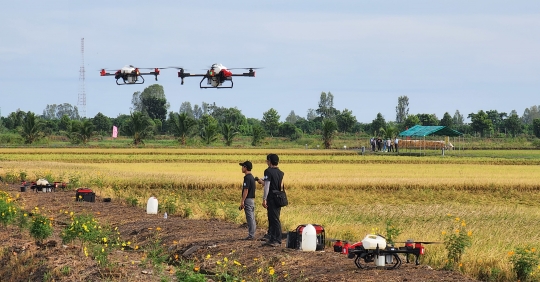Booming mechanization services
To bring mechanization to a wide range of applications in agricultural production, Mekong Delta communities have adopted many policies over time to support and encourage farmers and cooperatives to invest in machinery and equipment.
In Can Tho City, the agricultural sector is keen to replicate advanced production models, including the application of mechanized equipment in production. Mr. Tran Thai Nghiem, Deputy Director of the Ministry of Agriculture and Rural Development of Can Tho City, said that through projects such as the Vietnam Sustainable Agricultural Transformation Project (VnSAT), the Green Innovation Project in Agriculture and Food (GIC) or Agricultural Advisory programs have, with the support of a number of companies, developed models for the application of mechanization in the stages of production.
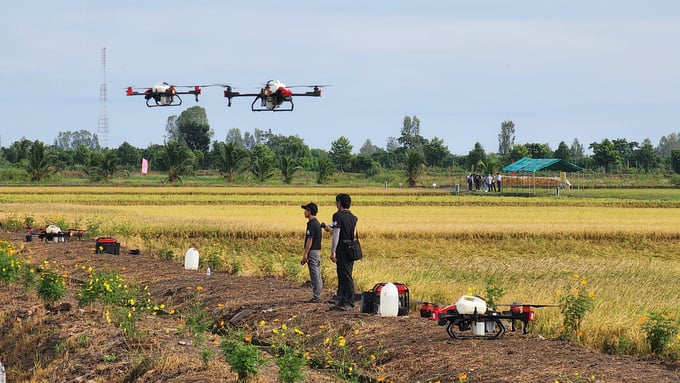
Many programs and projects to support and encourage farmers and cooperatives to invest in machinery and equipment have been used heavily in Mekong Delta communities. Picture: its metal.
It is worth emphasizing the application models of planting machines, cluster seeders, agricultural drones (drones), straw roller machines, mixers for the production of organic fertilizer from straw… Through the models, they have spread, disseminated highly effective methods and devices, and prerequisites for cooperatives and production plants, to boldly invest in equipment to carry out mechanization services.
At the same time, the Ministry of Agriculture and Rural Development of Can Tho City also recently coordinated with the City Union of Science and Technology to summarize and replicate people’s initiatives on mechanized equipment to meet the practical needs of the city.
The exciting result is that in recent times, Can Tho city in particular and the Mekong Delta in general have formed professional service groups and groups in the production stages. Because currently, every small farmer who wants to invest in mechanization must choose the appropriate type of investment.
The Toan Phat Agricultural Cooperative in Co Do District, with the support of a series of projects being carried out by the city’s Cultivation and Crop Protection Subdivision, is able to equip 10 straw rolling machines to produce agricultural products inside and outside the area. In addition, the cooperative will soon be backed with capital to deploy drone equipment and complete the rice production process through 100% mechanization.
Many resolutions and action plans have also been developed in Soc Trang province to encourage farmers and cooperatives to promote the application of mechanization. Specifically: Resolution No. 03/2019/NQ-HDND of July 10, 2019 of the Provincial People’s Council on the Promulgation of Policies to Support the Linkage of Production and Consumption of Agricultural Products in 2020-2025; Plan No. 183/KH-UBND of December 14, 2022 on agricultural mechanization and restructuring of agroforestry and fishery processing related to market development by 2025 with a focus on 2030.
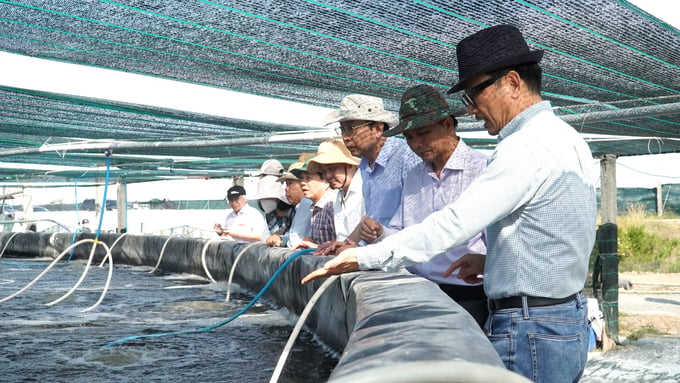
Soc Trang Province has deployed many high-tech application models in the field of fisheries. Picture: its metal.
In addition, Soc Trang has also applied many high-tech application models in fields ranging from animal husbandry to aquaculture to rice production. These can be mentioned as: The model of white-leg shrimp in ponds lined with tarpaulin soil practices VietGAP in Tran De District and Vinh Chau City; Model of linking production after bananas in connection with pre-processing and high-tech agriculture application in Chau Thanh district. In the field of rice production, farmers and cooperatives in Soc Trang Province are also supported with tillage machines, grain separators, mini rice mills, electric pumping stations, etc. to expand production scale related to synchronous mechanization.
In the past period, the National Center for Agricultural Advice has also set up and implemented many projects on the application of mechanization in the Mekong Delta, such as: . – 2021); The project to build a model of application of cluster seeders in rice production in Vinh Long and Bac Lieu provinces (period 2020 – 2022); The project builds a model for the application of tray plating – planting machine in rice production in some Mekong Delta provinces like Hau Giang, Tien Giang, Soc Trang (period 2020 – 2022).
Quickly remove the “bricks” that are in the way
Undeniably, it created an important new step for the region with programs, policies and regulations to support farmers in the application of mechanization. However, in order for mechanization to become synchronous, the removal of the “stones” that obstruct the wind of agricultural mechanization is urgently needed. The biggest difficulty that needs to be mentioned is capital.
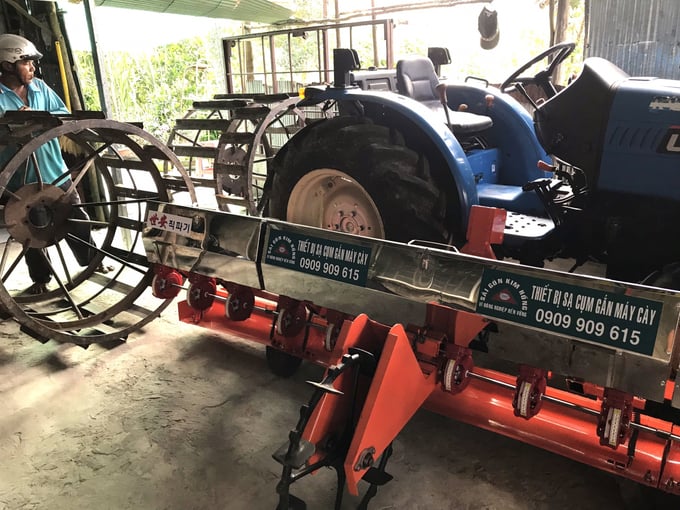
The plow-mounted cluster seeder has just been invested in the 2022-2023 winter-spring rice harvest by Toan Phat Agriculture Cooperative, aiming to complete the production process through mechanization. Picture: its metal.
It is currently very difficult to get credit for mechanization requests. Most cooperatives in the Mekong Delta have no access to bank credit because they have no collateral. Only cooperatives or farmers with strong enough potential can invest and provide services to their population. Many companies supplying machines and equipment for agricultural mechanization have also introduced many incentives and bought machines in the form of installments, but the high cost factor has also become an obstacle.
The issue of capital is also acknowledged by Mr. Le Duc Thinh, director of the Department of Economic Cooperation and Rural Development (MARD), Mechanization mechanisms and policies have been promulgated relatively fully by the state, but implementation is still limited and there is no consistency and synchronization.
Typically, the policy to support farmers and cooperatives to purchase agricultural production machinery in the Prime Minister’s Decision 68/2013/QD-TTg, access to loans from individuals and cooperatives is still difficult due to a lack of collateral. Or the mechanism of credit support for development investments in production facilities of agricultural machinery and equipment is not really attractive for mechanical investment companies, which also leads to undesirable results.
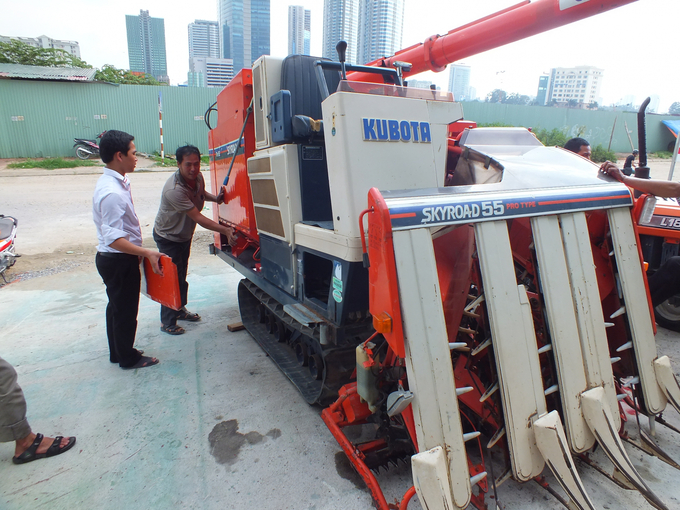
In the past long period, most of the mechanized machinery and equipment for Vietnam’s fields has depended on imports, with even a large amount of second-hand goods being imported, most of which came from Korea and Japan. Picture: Life.
Due to the specific mechanization policy of some municipalities, support is still low. If municipalities make a reasonable adjustment of support levels to market prices, this will create the motivation for people and cooperatives to invest in large-capacity machines for production.
Another problem is that currently the number of projects and programs supporting the application of mechanization on a large scale is not large in the whole Mekong Delta region, especially projects on preservation and processing due to technology and the Processing of agricultural, forestry and fisheries products are still poor and backward.
Promoting research and creating guidelines for the development of domestic agricultural machinery manufacturers is a sustainable and autonomous solution in the development of agricultural mechanization. This was particularly emphasized by Assoc. Prof. Dr.
Mr Bich said the state should have a synchronous policy to encourage investment in farm machinery and equipment manufacturing projects. Perhaps the policy of tax, credit, land … strongly supports domestic agricultural machinery manufacturers to improve technology. In particular, the exploration of materials, metallurgy, casting, supporting industries and the expansion of production scale to meet market demand.
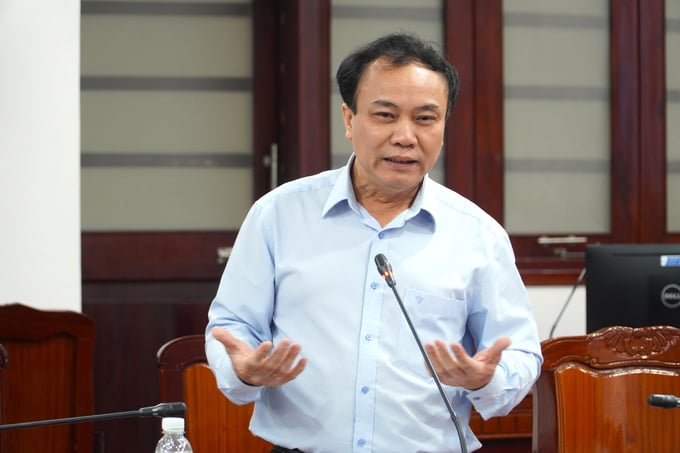
Mr Le Duc Thinh, director of the Department of Economic Cooperation and Rural Development (MARD), acknowledged that the mechanisms and guidelines on mechanization are relatively complete, but when implemented there is no consistency. Picture: its metal.
In another aspect, Mr. Nguyen Thanh Hong, Chairman of the Board of Toan Phat Agricultural Cooperative in Co Do District (Can Tho City), pointed out a fact: Currently, both the cooperative itself and its members do not have much experience in using and controlling machines and facilities when investing. In order to be able to provide mechanized services to the cooperative members, the cooperative must have a young worker who can attend training courses organized by companies or professional agencies. Currently, however, most cooperative leaders are old and have limited skills, resulting in device application not performing as expected.
According to the target, by 2030 in our country’s cultivation, the rate of synchronous mechanization will reach 70%, animal husbandry will reach 60%, aquaculture production will reach 90%, forestry will reach 50%, and salt production will reach 90%. Transform Vietnam into a top 10 world agricultural processing hub by 2030. To achieve this goal, it is necessary to invest in mechanization drastically and synchronously, combining the reorganization of production, infrastructure investments and the knowledge journey of farmers. If successful, the use of agricultural machinery and equipment will be within reach, and mechanized equipment will promote its proper role and effectiveness.

